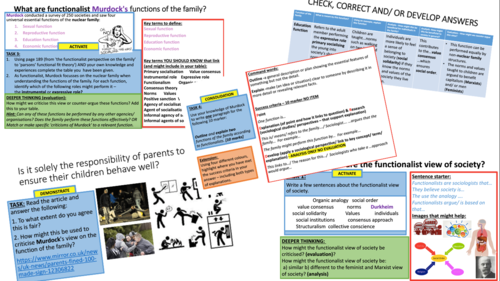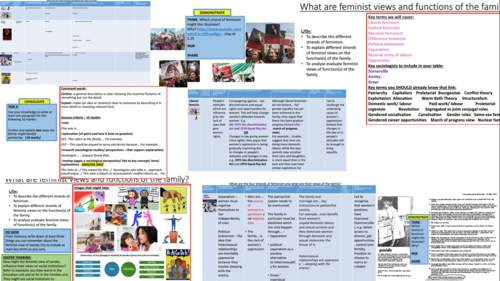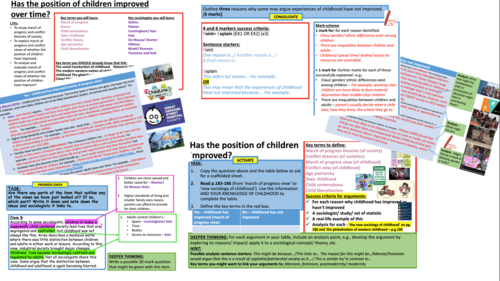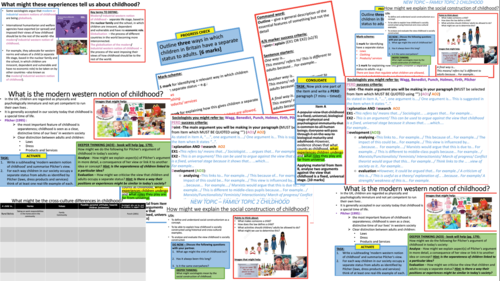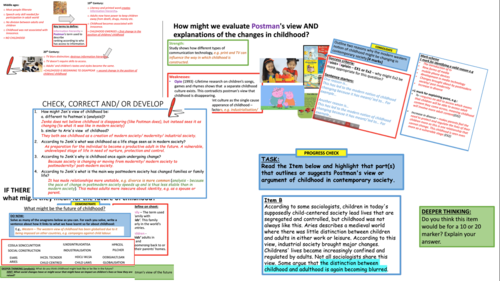
154Uploads
20k+Views
4k+Downloads
Sociology

Introduction to Yr 13 Sociology
Introduction lessons that outlines the AQA A-level course, expectations, revision resources and guidance. Rest of lessons enables students to recap the AOs, ways they might develop and/ or demonstrate in. Students are directed to create AO specific goals and action plans to meet each. Lesson also teaches students how to highlight with purpose. Comes with worksheet and ANSWERS for activities.
Can be differentiated down for GCSE and can be edited to make applicable for ANY SPEC.

Families - Families in a global context
No starter activity
REQUIRES OWENS AND WOODFIELD AQA GCSE TEXTBOOK FOR MAIN ACTIVITIES
Answers for MAIN activities included

AQA GCSE Sociology - Research methods - Structured and Unstructured interviews
Detailed lesson with lots of scaffolding based on adaptive teaching that help students understand the advantages and disadvantages of using interviews for investigating sociological issues (e.g. identifying the different types of interviews and their features, explaining the strengths and weaknesses of structured and unstructured interview and be able to apply out knowledge of the strengths and weaknesses of structured and unstructured interviews to 4 markers).
Covers the following key terms: Structured interview, Unstructured interview, Semi-structured interview, Group interviews (Focus groups), Interviewer bias/ effect, Interview schedule
This lesson introduces students to all types of interviews but only looks at the strengths and weaknesses of structured and unstructured interviews.
ANSWERS TO MOST ACTIVITIES INCLUDED
RESOURCES CAN BE FOUND AT THE END OF THE PPT

AQA A-level Families - Couples: Money management and decision making
Detailed and differentiated (up and down) student-led lesson that examines and analyses the following key terms to examine how money might be managed and how decision-making might be organised in families : Power, The allowance system, Pooling, Cultural/ Ideological explanation (of decision making), Material/ Economic explanation of inequality (of decision making),Personal life perspective (of money)
Examines the views of the following sociologists:
PAHL AND VOGLER (1993), Barret and McIntosh, Kempson, EDGELL, Laurie and Gershuny, CROMPTON AND LYONETTE, Pahl
***** Makes reference to other key terms students might know that link. **
***** ANSWERS for MAIN activities INCLUDED****
Uses and refers to ’ AQA A Level Sociology Book One Including AS Level: Book one 3rd Revised edition by Rob Webb, Hal Westergaard, Keith Trobe, Annie Townend ’ textbook

AQA A-level Sociology Families: Theories of the family - Murdock’s four functions of the family
Detailed and differentiated (up and down) student-led lesson that recaps the functionalist view of society and examines and evaluates functionalist Murdock’s four functions: Sexual function , Reproductive function , Education function , Economic function.
Lesson makes links to other functionalist and family key terms that students might have previously been taught.
Main activity makes reference to AQA A-level Book 1 by Townsend but an alternative book that covers this content can be used.
MAIN ACTIVITY INCLUDES ANSWERS
Starter assesses prior learning on Childhood topic.
WORKSHEETS AT THE END OF THE PPT

AQA GCSE Sociology - Research Methods - Ethnography
Detailed lesson with lots of scaffolding based on adaptive teaching that help students understand what ethnography is as a research method and its main features, explain the strengths and weaknesses of using ethnographic research to study sociological issues and topics.
Cover the following key terms:
Ethnography
Triangulation
Includes 4 marker with success criteria for answering it
Covers the following sociologists:
Mead
Whyte
Young and Wilmott
ANSWERS TO SOME ACTIVITIES INCLUDED
RESOURCES CAN BE FOUND AT THE END OF PPT

AQA GCSE Sociology: Families - Domestic violence
Detailed lesson with lots of scaffolding based on adaptive teaching that help students understand how might power in the family be abused.
Cover the following key terms: Domestic violence
Covers the following organisations:The (BCS) British Crime Survey, NSPCC (National society for the Prevention of Cruelty to Children
Icon for visual learning
Enables students to look at how power imbalance between adults and children can lead to different forms child abuse.
Includes 3 marker on power as starter with detail scaffolding.
INCLUDES ANSWERS FOR MAIN ACTIVITIES (excluding starter and plenary)
Includes discussion activity to encourage oracy.

AQA GCSE Sociology: Family- Changing patterns of marriage and their explanations
Detailed lesson with lots of scaffolding based on adaptive teaching that help students understand changing patterns of marriage and their explanations.
Examines the trends in first marriages, marriages in churches, serial monogamy and age of marriage and the reasons for them.
Provides scaffolding to allow student to apply Marxism, functionalism and feminism (and sociologists they should have previously learnt about - Parsons, Ansley, Zaretsky and Delphy and Leonard) to the changing patterns of marriage.
Mind map for main activity can be printed out or you can get students to copy it out.
Includes a 4 marker with scaffolding to help students answer it.
RESOURCES CAN BE FOUND AT THE END OF THE PPT.
Covers the following key terms: Serial monogamy, Re-marriages
Makes reference to the following key sociologists: Bridebook, Parsons, Ansley, Zaretsky, Delphy and Leonard
Makes links to the following key terms that you should already know: Stigma, Secularisation, Feminism, Cohabitation - promotes a spiral curriculum by making links to key terms that students might have previously been taught that link to this lesson.
ANSWERS TO ALL MAIN ACTIVITIES INCLUDED

AQA GCSE Sociology Education - Policies tackling inequality
Detailed lesson with lots of scaffolding based on adaptive teaching that help students understand to what extent might education reforms have tackled educational inequality (e.g the main education policies and reforms that have had an impact on the education system, using examples - how education policies or reforms have tackled inequality in education).
Covers educational policies that tackle class, gender and ethnic differences in educational achievement and gender differences in subject choice.
Covers the following policies: Marketisation policies and social inclusion
Key terms you SHOULD know that link:
Educational policies/ reforms, Marketisation, Open enrolment, Academies, Formula funding, League tables, Ofsted reports, Tripartite system, Class differences in educational achievement, Gender differences in educational achievement, Ethnic differences in educational achievement, Gender differences in subject choice, External vs internal factors, Cultural vs Material factors, Material deprivation, Cultural deprivation, Speech codes, Gender roles, socialisation, Gendered subject images, Gendered career opportunities
ANSWERS TO MOST ACTIVITIES INCLUDED .
RESOURCES CAN BE FOUND AT THE END OF PPT

AQA GCSE Sociology - different stages of education and types of schools
Detailed student led lesson on the different stages of education, the different types of schools and the state vs independent divide in education (including arguments for and against private schools). Lesson has been planned to stretch and challenge the most able and includes scaffolding to support all pupils with meeting the lesson objectives.
This lesson also goes through the different types of schools for different ages: Nursery, Primary, Secondary, Sixth form and Higher education.
PLEASE NOTE - Progress check activity requires students to think about the types of schools that apply to their school so you will need to edit it to make it relevant.
covers the following key terms: Nursery school and classes, Primary Schools, Secondary schools, Sixth form, Higher education, State schools, Academies, Free schools, Special schools, Faith schools, Grammar schools, Independent/ private schools, Specialist schools, National curriculum, Public schools (extension), Local Education Authorities (LEAs) (extension), Admission policy (extension), Ofsted (extension)
Answers included for main activities (excluding the plenary)
Includes a 3 marker with a success criteria and student-friendly mark-scheme.
Resources can be found at the end of the PPT

AQA GCSE Sociology - Research Methods: What PET issues might sociologists consider for research?
Detailed lesson with lots of scaffolding based on adaptive teaching that help students understand what are PET issues that sociologists consider when designing and conducting research (e.g. define and identify possible practical, ethical and theoretical (PET) advantages and disadvantages of social research and explaining PET’s differences
Covers the following key terms: Practical issue, Ethical issues, Theoretical issues,Anonymity, Confidentiality , Informed consent, Covert research (extension), Pseudonym (extension), Mixed method (extension) Findings (of research) (extension).
Key bodies, laws and theories we will cover: British Sociological Association, Data Protection Act 1998, Positivism, Interpretivism
Answers to most main activities are included
Resources can be found at the end of the PPT

AQA GCSE Sociology Different family structures introduction
Detailed lessons with lots of scaffolding based on adaptive teaching that help students understand different family structures
Covers the following key terms: family, cohabitation, household, family form, family diversity, nuclear family,lone-parent family, same-sex family, reconstituted family, extended family and empty-nest family.
Answers to main activities are included
Students should know the following key terms prior to reading: contemporary society, homosexuality, heterosexuality
Resources can be found at the end of the PPT
Made to meet the AQA spec but can be used (and edited if needed) for other exam boards.

AQA A-level Sociology Families: Theories of the family – Feminist views of the family (UPDATED))
Detailed and differentiated (up and down) student-led lesson that examines and evaluates Liberal (Somerville), Radical (Greer), Marxist (Ansley) and Difference feminist views and functions of the family.
Lesson explores the concepts: Political lesbianism , Separatism, Reserve army of labour, Oppression
Lesson makes links to general feminist key terms and other key terms that students might have previously been taught, e.g. Patriarchy, Capitalism, Proletariat, Bourgeoisie, Conflict theory, Exploitation, Alienation, Gendered socialisation Canalisation Gender roles, Warm Bath Theory, Structuralism, etc.
Main activity makes reference to AQA A-level Book 1 by Townsend
***** ALL ANSWERS INCLUDING ANAYSIS FOR TABLE ACTIVITY NOW INCLUDED ****
NOW INCLUDES MODEL PARAGRAPH FOR 10 MARKER
***** WORKSHEETS AT THE END OF THE PPT****

AQA A-level Families- Couples: Intro to the family structures/ types
Detailed and differentiated (up and down) student-led lesson that examines and analyses the following key terms to introduce students to the main family structures: Family, Household,Family structure/ type, Nuclear family, Lone-parent family, Same-sex family, Reconstituted family (or blended family) , Beanpole family, Extend family (horizontally and vertically) , Empty-nest family, Cohabitating couples, Contemporary society, Traditional, Family diversity, Living Apart Together/ LATs (extension)
***** ANSWERS for MOST MAIN activities INCLUDED****
***** ALL RESOURCES INCLUDED AND CAN BE FOUND OUT THE END OF PPT *****

A-level AQA Families Topic 2 Childhood- Has the position of children improved over time?
Detailed and differentiated student-led lesson that explores march of progress theory, Toxic childhood, Conflict theory, Age patriarchy, Child liberationism as a way to examine the different views (march of progress and conflict views) of whether childhood has improved over time. Includes views of Gittins, Palmer, Firestone and Holt, Aries etc.
Main activity requires pages from the AQA A Level Sociology Book One Including AS Level: Book one 3rd Revised edition by Rob Webb, Hal Westergaard, Keith Trobe, Annie Townend
ANSWERS INCLUDED FOR MAIN ACTIVIES
RESOURCES CAN BE FOUND AT THE END OF PPT

A-level AQA Families Topic 2 Childhood- Social construction of childhood
Detailed and differentiated student-led lesson that explores childhood, social constructionism, industrialisation (briefly), the globalisation of western childhood , western notion of childhood as a way to introduce students to the idea of the social construction of childhood. Mostly focusses on cross-cultural differences in childhood but briefly covers historical differences of childhood in Britain.
Explores the views of sociologists such as Pilcher, Benedict, Wagg, Punch, Holmes, Firth and Malinowski.
AQA A-level Families Topic 2 Childhood- Lesson 1
One of the activities require pages from the AQA A Level Sociology Book One Including AS Level: Book one 3rd Revised edition by Rob Webb, Hal Westergaard, Keith Trobe, Annie Townend
RESOURCES CAN BE FOUND AT THE END OF PPT
ANSWERS INCLUDED FOR SOME ACTIVITIES
INCLUDES EXAMS QUESTIONS

A-level AQA Families Topic 2 Childhood– The future of childhood
Detailed and differentiated student-led lesson that explores Information hierarchy , Postmodernity/ postmodern society/ contemporary society, Modernity/ modern society/ industrial society, Accordion family, Boomerang children as a way to examine the changes to the modern western notion of childhood in contemporary society. Covers the views of Postman and Jenks.
Activities require pages from the AQA A Level Sociology Book One Including AS Level: Book one 3rd Revised edition by Rob Webb, Hal Westergaard, Keith Trobe, Annie Townend
RESOURCES CAN BE FOUND AT THE END OF PPT
ANSWERS INCLUDED FOR MAIN ACTIVITIES
**INCLUDES EXAM QUESTIONS **

AQA A-level Sociology: Education Topic3 Ethnic differences -Material deprivation & racism in society
Detailed and differentiated (up and down) student led lesson on how a. material deprivation and b. racism in wider society might cause ethnic differences in achievement. Makes reference to key terms material vs cultural factors, external vs internal factors, the meaning/ patterns of ethnic differences in achievement.
Uses and refers to ’ AQA A Level Sociology Book One Including AS Level: Book one 3rd Revised edition by Rob Webb, Hal Westergaard, Keith Trobe, Annie Townend ’ textbook
RESOURCES CAN BE FOUND AT THE END OF THE PPT.
ANSWERS FOR MAIN ACTIVITIES CAN BE FOUND ON NEXT SLIDE AFTER ACTIVITY SLIDE
INCLUDES ORACY ACTIVITY

WRITING FRAME - AQA A-level Sociology: Families – Topic 5 Changing patterns (divorce) 20 marker
Detailed writing frame that scaffolds (from introduction to conclusion) a full answer for a 20 marker on divorce (family -topic 5 changing family patterns). Models how to use the item to select points or arguments to answer the question.
*** Based on AQA specification**
Supports students with planning the 20 marker - using planning success criteria.
Outlines the success criteria and provides sentence starters for the full essay (intro, main body and conclusion). Success criteria used for paragraphs in main body of essay is PEELE/A
Outlines the key terms, sociologists, theories that can be used when answering the question.
Supports students who need support and guidance with writing essays whilst providing students who are already good at writing essays opportunities to further improve their essay skills.

WRITING FRAME - AQA A-level Sociology: Families – Topic 4 Demography (position of old) 20 marker
Detailed writing frame that scaffolds (from introduction to conclusion) a full answer for a 20 marker on whether the posiiton of the old is changing for the better. (family -topic 4 demography).
*** Based on AQA specification**
Models and students with how to use the item to answer essays.
Outlines the success criteria and provides sentence starters for the full essay (intro, main body and conclusion). Success criteria used for paragraphs in main body of essay is PEELE/A
Outlines the key terms, sociologists, theories that can be used when answering the question.
Supports students who need support and guidance with writing essays whilst providing students who are already good at writing essays opportunities to further improve their essay skills.





